Unless you’ve been out of the loop (and even then, the news would likely find you), you’re aware that the EU General Data Protection Regulation) is now fully operational. This regulation empowers EU citizens with control over the personal data collected by websites and services they engage with.
This global shift affects website owners universally, as any site catering to even a single EU citizen is mandated to adhere to GDPR guidelines. Therefore, whether your base is in Paris, France, or Paris, Texas, GDPR is a non-negotiable obligation.
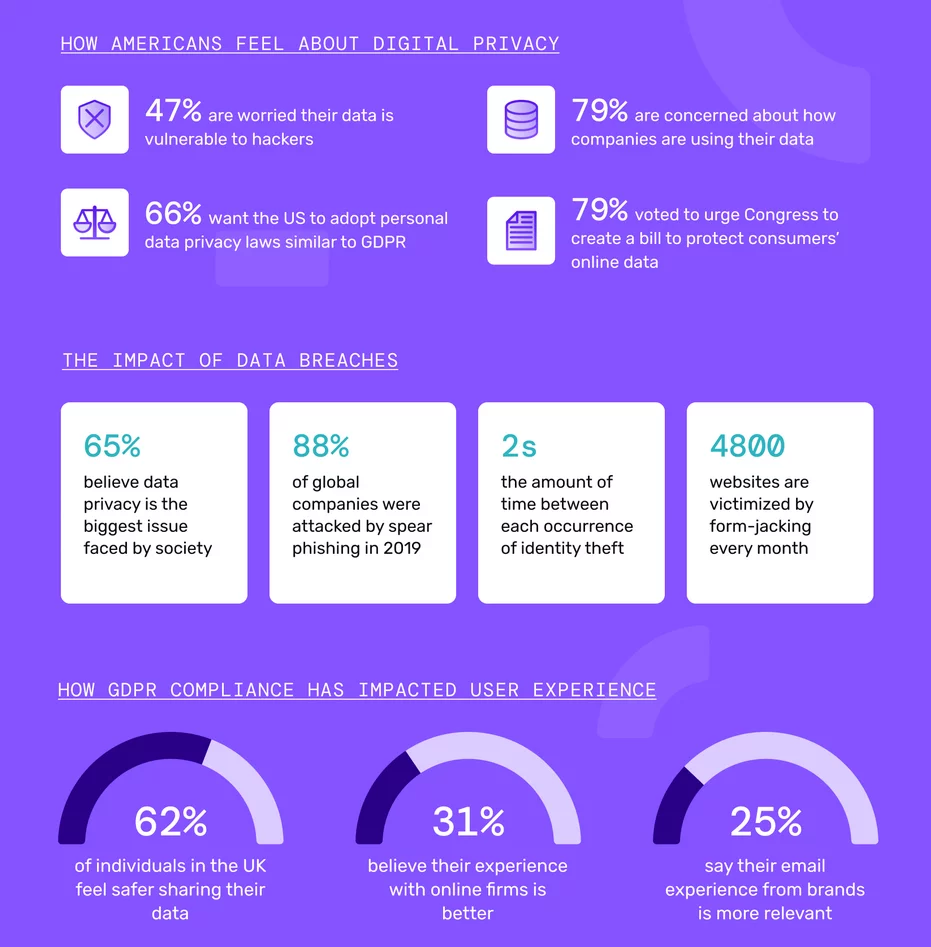
The online landscape has been a flurry of activity, with companies inundating users with email notifications and swiftly revising privacy policies. If you haven’t had a chance to address this matter yet – fear not. We’ve got you covered!
Benefits of GDPR Compliance:
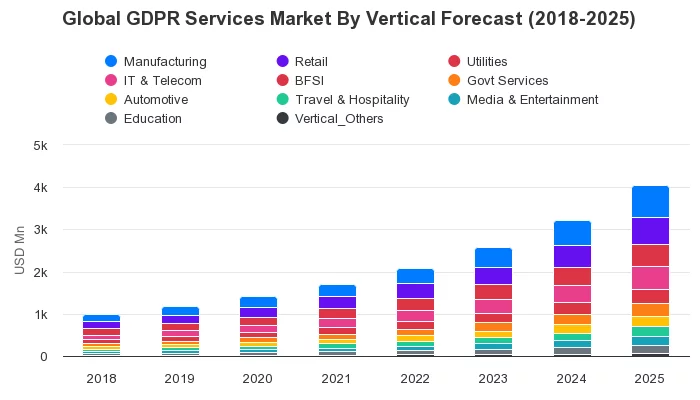
Source: Wantstats
- Legal Compliance: Understanding GDPR ensures that individuals and organizations comply with European data protection laws. This is crucial, especially for businesses operating within the European Union or dealing with EU citizens’ personal data.
- Global Relevance: GDPR has influenced data protection regulations worldwide. Knowledge of GDPR principles provides a foundation for understanding and navigating similar privacy laws in other regions, facilitating global compliance.
- Enhanced Data Security: Learning about GDPR helps in implementing robust data security measures. This includes encrypting sensitive information, conducting regular risk assessments, and adopting best practices to prevent data breaches and cyber threats.
- Trust and Customer Confidence: Demonstrating compliance with GDPR builds trust with customers. Individuals are increasingly concerned about the privacy and security of their personal data. Knowing that an organization follows GDPR instills confidence in customers regarding the responsible handling of their information.
- Avoidance of Penalties: Non-compliance with GDPR can result in significant fines. By understanding the regulations and adhering to them, organizations can avoid legal consequences and financial penalties associated with data breaches or privacy violations.
- Data Subject Rights: GDPR emphasizes the rights of data subjects (individuals) over their personal data. Learning about GDPR ensures that organizations understand and respect these rights, such as the right to access, rectify, or erase personal data.
- Improved Data Management Practices: GDPR encourages organizations to adopt transparent and ethical data management practices. This includes having clear data processing policies, obtaining explicit consent for data processing, and implementing procedures for data retention and disposal.
- Competitive Advantage: Being GDPR-compliant can be a competitive differentiator. Customers are increasingly choosing businesses that prioritize their privacy. Organizations that showcase their commitment to data protection gain a competitive edge in the market.
- Risk Mitigation: Understanding GDPR helps in identifying and mitigating risks associated with data processing. This proactive approach minimizes the likelihood of data breaches, reputational damage, and legal issues.
- Professional Development: Knowledge of GDPR is a valuable skill in various professional domains, including legal, compliance, IT, and marketing. Individuals with expertise in data protection and privacy are in demand, contributing to professional growth and career advancement.
- Ethical Data Handling: Learning about GDPR fosters a culture of ethical data handling within organizations. It encourages responsible use of data, promoting respect for individuals’ privacy rights and fostering a positive organizational reputation.
Top 8 GDPR Resources:
1. The GDPR Compliance Checklist

Navigating the intricate landscape of General Data Protection Regulation compliance is imperative for businesses managing personal data. Our meticulously crafted interactive checklist serves as a crucial guide, systematically leading you through essential steps to ensure strict adherence to the regulations.
Key Features:
- Comprehensive Coverage: Although not exhaustive, the checklist spans a broad spectrum of compliance requirements, acting as a foundational tool to address key aspects of GDPR.
- User-Friendly Interface: The interactive nature of the checklist ensures a user-friendly experience. Easily track and check off completed tasks for a clear visual representation of your compliance progress.
- Peace of Mind: The structured checklist provides peace of mind amid the complexity of GDPR. Systematically addressing compliance requirements alleviates the stress associated with data protection regulations.
- Expert Curation: Curated by developer Erwan Richard, the checklist incorporates industry expertise and insights, adding credibility as a reliable resource for compliance efforts.
2. Awesome GDPR

Developed by Erwan Richard, the Awesome GDPR Checklist transcends a simple list, offering a curated array of tools and resources to streamline your journey to compliance. This resource presents alternatives to widely used services like Google Analytics and Maps, along with privacy-focused social sharing buttons.
Key Features:
- Tool Recommendations: Tailored recommendations cover various aspects, from data analytics to mapping services, ensuring a holistic approach to GDPR compliance.
- Privacy-Focused Alternatives: Discover alternatives prioritizing user privacy for popular services like Google Analytics and Maps, enabling you to maintain data protection standards while utilizing essential functionalities.
- Developer Insight: Benefit from Erwan Richard’s developer expertise. The curated list reflects an understanding of the technical nuances in GDPR compliance, offering practical solutions for both developers and businesses.
- Continuous Updates: In tandem with evolving regulations and technology, the checklist undergoes regular updates, reflecting the latest trends and tools. Stay current with the ever-changing landscape of data protection.
3. Complianz GDPR/CCPA Cookie Consent
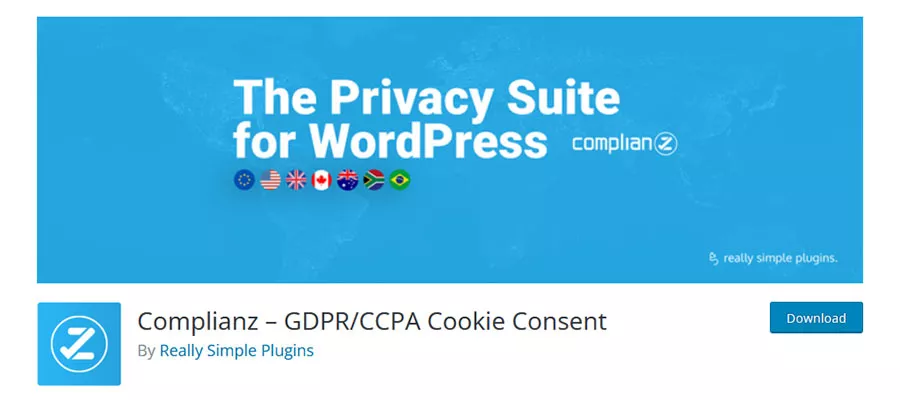
With the evolution of WordPress 4.9.6 to accommodate privacy concerns, Complianz stands out as a powerful tool designed for GDPR and CCPA compliance. The plugin conducts a meticulous scan of your WordPress website, generating a tailored cookie consent notice and policy based on the findings. Offering unparalleled flexibility, Complianz allows you to configure the display of a region-specific cookie notice or implement a universal notice for all users. Beyond notice generation, the plugin actively blocks common third-party cookies and iframes, providing a robust privacy suite for your website. Complianz not only simplifies compliance but elevates the user experience by seamlessly integrating privacy measures.
Key Features:
- Customized Notices: Tailor cookie consent notices and policies based on the specific needs of your website.
- Flexible Configuration: Implement region-specific or universal cookie notices to cater to diverse user bases.
- Active Blocking: Actively block common third-party cookies and iframes to enhance user privacy and security.
- User-Friendly Integration: Seamlessly integrate privacy measures into your website, prioritizing both compliance and user experience.
Your guide to GDPR here.
4. ComplianceRank:
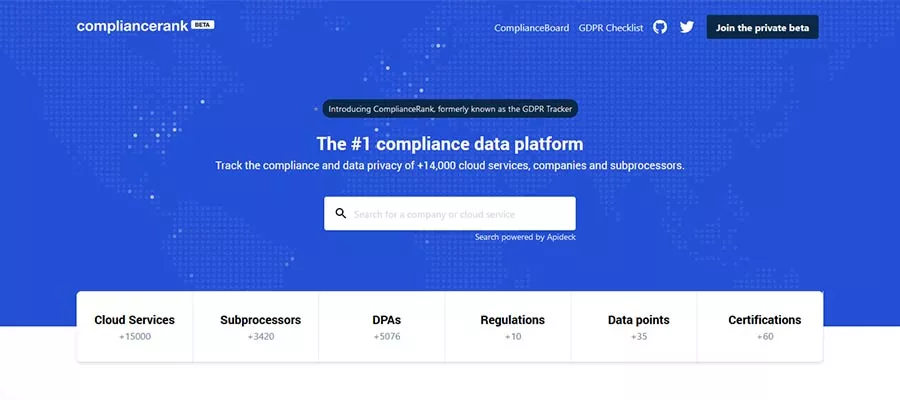
In the complex landscape of third-party and cloud services, ensuring compliance becomes a paramount concern. ComplianceRank, developed by the same experts responsible for the comprehensive checklist mentioned earlier, emerges as an indispensable solution. This tool provides a wealth of compliance-related information, including details on a company’s country of headquarters, current compliance status, certifications, and an extensive list of sub-processors they engage with. By offering transparency into the compliance standing of external services, ComplianceRank empowers users to make informed decisions and maintain regulatory adherence seamlessly across their digital ecosystem.
Key Features:
- Comprehensive Compliance Data: Access detailed information on a company’s headquarters, compliance status, certifications, and sub-processors.
- Decision Empowerment: Make informed decisions regarding third-party and cloud service providers based on transparent compliance data.
- Holistic Compliance Information: Obtain a holistic view of a company’s commitment to compliance, fostering trust and reliability.
5. Anonymizer:
Developers dealing with databases containing sensitive user information in a developmental environment find a valuable ally in Anonymizer. This tool goes beyond conventional anonymization by replacing identifiable information with randomly generated content. While not intended for production environments, Anonymizer adds an extra layer of security during the development phase. Its contribution to data protection is essential, safeguarding personal data by anonymizing information and mitigating potential security risks associated with handling sensitive user data during the development process.
Key Features:
- Advanced Anonymization: Replace identifiable information with randomly generated content for enhanced security.
- Developmental Security: Provide an added layer of security during the development phase, mitigating potential risks.
- Data Protection Assurance: Safeguard personal data by anonymizing information, ensuring compliance with privacy regulations.
6. GDPR Module for Drupal:
For Drupal site operators aspiring to achieve GDPR compliance, the Module offers indispensable assistance. This module serves a dual purpose, enabling users to transparently view the data collected by the website while furnishing administrators with powerful tools to effectively manage data and user consent. By providing a user-friendly interface and robust functionalities, the GDPR Module empowers Drupal site owners to navigate the intricacies of data protection regulations seamlessly.
Key Features:
- User Transparency: Allows users to view the data collected by the website, promoting transparency in data processing.
- Administrator Tools: Equips administrators with tools to efficiently manage data and user consent, streamlining compliance efforts.
- User-Friendly Interface: Offers an intuitive interface, ensuring a smooth and straightforward experience for both users and administrators.
7. Cookies EU Banner:
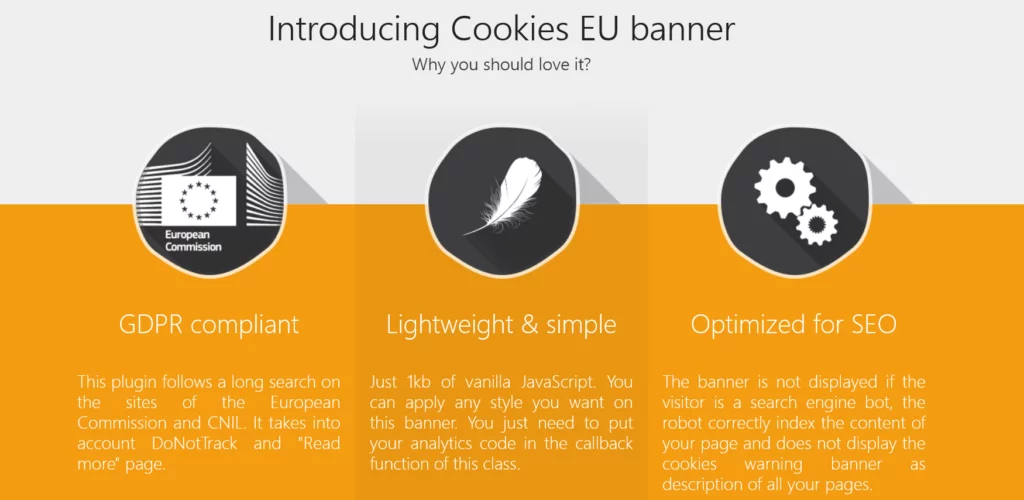
The Cookies EU Banner is a lightweight JavaScript library tailored for Drupal users seeking user consent for tracking services like Google Analytics. Its simplicity lies in the ease of implementation, requiring just a snippet of code at the top of your page to initiate. Notably, this library provides the option to defer setting a cookie until the user has explicitly accepted the privacy policy. The Cookies EU Banner proves to be an effective and user-friendly solution for obtaining and managing user consent related to tracking services.
Key Features:
- Lightweight Library: A lightweight JavaScript library designed for easy implementation on Drupal sites.
- User Consent Management: Facilitates user consent for tracking services such as Google Analytics.
- Deferred Cookie Setting: Option to delay setting a cookie until the user has accepted the privacy policy, enhancing user control.
8. GDPR Developer Guide:
For developers seeking a comprehensive crash course in GDPR compliance within the Drupal ecosystem, the Developer Guide serves as an invaluable open-source resource. Spanning 16 chapters, the guide covers everything from identifying personal data to working with analytics. Its primary objective is to equip developers with the knowledge and tools necessary to build websites with privacy regulations at the forefront. As it becomes a permanent fixture in web design, this guide empowers developers to integrate privacy considerations seamlessly into their projects.
Key Features:
- Comprehensive Coverage: Offers a detailed exploration of GDPR compliance, spanning 16 chapters for a holistic understanding.
- Practical Information: Provides practical insights for developers, covering aspects like personal data identification and analytics integration.
- Open-Source Resource: An open-source guide, fostering collaboration and continual improvement in the realm of GDPR compliance.
Conclusion:
In the dynamic landscape of web design, GDPR compliance has become a paramount consideration for designers and developers alike. As it becomes a permanent fixture in web design, these resources empower professionals to seamlessly integrate privacy considerations into their projects. Whether it’s obtaining user consent, managing data transparently, or understanding the intricacies of compliance, these tools and guides contribute to a robust approach to GDPR. Embracing compliance not only safeguards against legal repercussions but also establishes trust with users and enhances the reputation of websites and businesses.
FAQs:
Who Should Be Concerned About GDPR Compliance?
Any web designer or developer creating sites accessible to EU citizens, regardless of their own location or the business’s base, should prioritize GDPR compliance.
How Does GDPR Affect Web Design Practices?
GDPR impacts how personal data is collected, stored, and used on websites. Web designers must ensure clear consent forms, secure data storage, and transparent privacy policies.
- their data, and secure data encryption.
- Can a Website Be GDPR Compliant Without Affecting Its Design Aesthetics?
Yes, GDPR compliance primarily involves backend processes and transparent communication with users, allowing seamless integration with a website’s design. - What Happens If a Website Isn’t GDPR Compliant?
Non-compliance can lead to legal action, substantial fines, and damage to a website’s and business’s reputation for inadequately protecting user data. Prioritizing GDPR compliance is crucial for maintaining legal adherence and fostering user trust.



